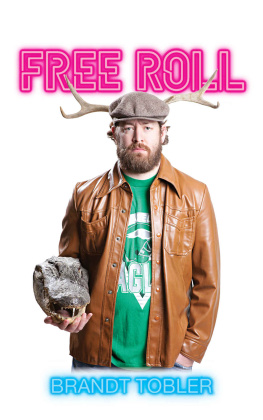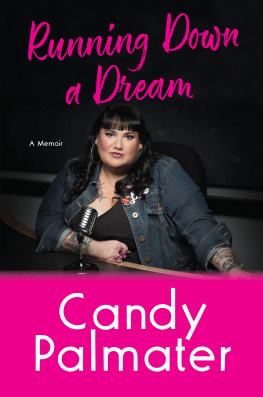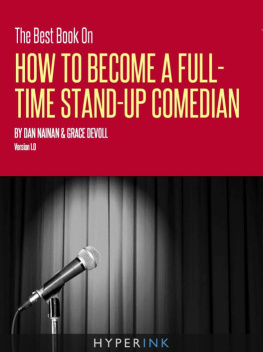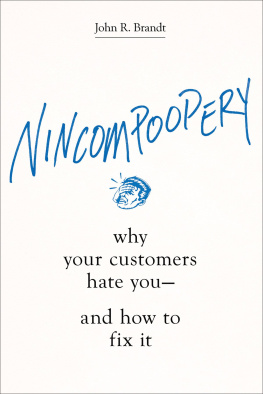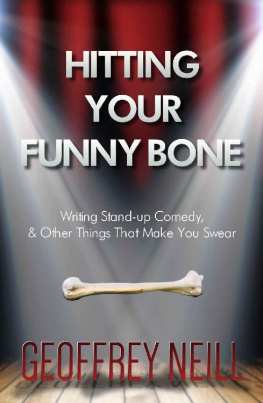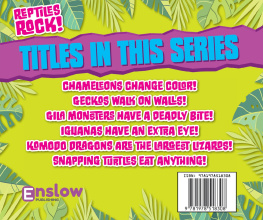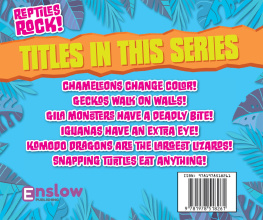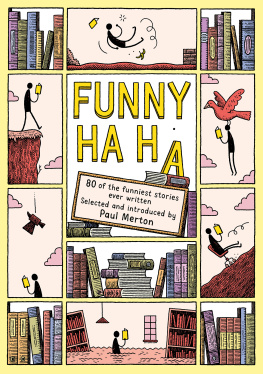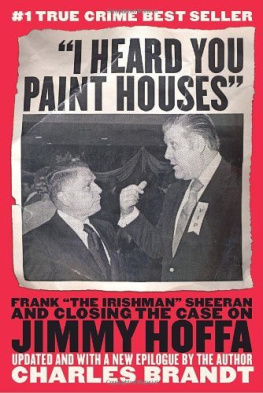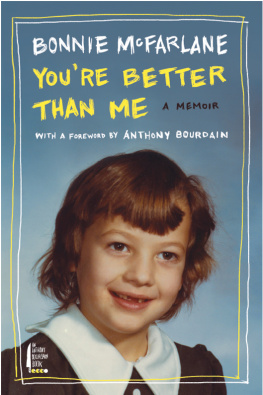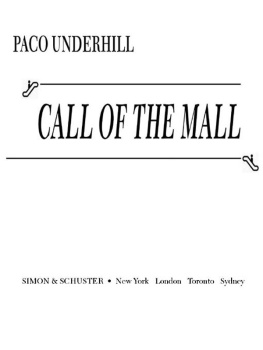FREE ROLL
BRANDT TOBLER
2017 Brandt Tobler. All rights reserved. Printed and bound in the United States of America. No part of this book may be reproduced or transmitted in any form or by any means, electronic or mechanical, including photocopying, recording, or by an information storage and retrieval systemexcept by a reviewer who may quote brief passages in a review to be printed in a magazine, newspaper, or on the webwithout permission in writing from the author.
Cover & Book Design by Nikki Ward, Morrison Alley Design
Although the author and publisher have made every effort to ensure the accuracy and completeness of information contained in this book, we assume no responsibility for errors, inaccuracies, omissions, or any inconsistency herein. Any slights of people, places, or organizations are unintentional.
First Printing 2017
ISBN 978-0-9987948-0-8
Lions Park Press
NOTE:
I honestly believe that you own everything that has happened to you. Tell your stories!
If people wanted me to write warmly about them, they shouldve behaved better. Unfortunately my lawyers disagree. So even though all the stories in this book are true, I was encouraged to change a few names and details to protect the innocent, keep some cowards out of jail, and not let the world know that I may have had relations with a few women I technically wasnt supposed to. I was told changing these names would protect me from scumbag lawyers, the FBI, the IRS, Russian mobsters, Mexican cartel members, and psycho angry husbands. So if somebody tells you I am talking about them in this book, I probably am!
This book is dedicated to my amazing Grandparents Harl and Flora Petty. You never said it, but I know I was your favorite grandchild. I LOVE YOU!
Introduction
This book was written by me, a standup comedian. It will take you through tragedy after tragedy on its path to the funny. Will it make you laugh? Eventually. Will it make you cry? Probably. But I hope it will also make you smile, dream and reflect, while simultaneously inspiring you to never stop chasing your dreams, even if your very own family is constantly trying to derail them.
Family issues, by the way? Thats my story. I was raised on the blustery streets of Cheyenne, Wyoming. I couldnt wait to get out of the small town life to see if I could thrive in the big city. Before I knew it I was living in Las Vegas, carrying hundreds of thousands of dollars in cash, and risking my life every single day. I took a huge gamble on my life while literally gambling on behalf of some of the biggest professional gamblers on the planet. I found myself in a shady underground world of drugs, gambling, sex, and attempted murder. All this while trying to rebuild a father-son relationship that meant so much to me and so little to my dad. My adventures have nearly gotten me killed on numerous occasions but, luckily for you, I survived long enough to write this book for your reading enjoyment.
I guess this book could be called a memoir, but that sounds too fancy. I am far from fancy. I would rather call this book what it is: My Collection of Chaos. And, as a three-time junior college drop-out, I am so proud for finishing it. I never thought I would write a book. Shit, I can barely write an email. But day after day I wrote. In crappy hotel rooms, smoky green rooms, and crowded coffee shops, I wrote. I interviewed countless family members and friends, asking them to go into great detail recounting memories they had been desperately trying to forget. I edited on seven-hour bus trips, proof-read on lousy airport wi-fi, and rewrote page after page while crammed in a middle seat in row twenty-seven between two nosy neighbors. And then one day it was finally done. Or at least I thought it was. (Cue another six months of work and editing!)
The process of writing this book has been a lot like my life. Things havent always come easy, but I tried to keep going, every single day. I hope this book will inspire you to do the same, whether you dream of being on the comedic stage yourself or following some other wild adventure of your own making.
Brandt Tobler
FREE ROLL DEFINED
T he exact definition of a free roll is not one you will find in a dictionary. It is a term I learned from Keith, my boss and mentor, the first day I started working for him as a professional gambler. My job entailed running up and down the Las Vegas strip betting hundreds of thousands of dollars each day while trying not to get robbed or killed. On my first day of work I heard him say it three or four times and I had never heard the term, so I asked him what it meant. He explained it like this; There are two different kinds of free rolls: theres your traditional free roll and then theres every gamblers enemy, the free roll for disaster.
The easiest way to explain a free roll is this: Imagine that I give you two dice and say you get one roll. If you get a seven I will give you a million dollars, but if you roll any number beside a seven you get nothing. That means you have a 16.7% shot at a million dollars, and an 83.3% chance of gaining nothing, but also losing nothing. Essentially, you have a free shot at $1,000,000. Sure, its only a 16.7% chance at a cool million, but only a positive outcome can come of it its a free roll. Now a free roll for disaster is fundamentally the same thing, but this time the result can only be negative. Imagine that I give you two dice again. This time if you roll a seven I get your house and car, but if you roll anything else you lose nothing, and you gain nothing. Essentially, you have a free shot at losing your house and car. Now that 16.7% number feels a whole lot more likely and the thought of losing your home and your car feels far more real. This is an example of a free roll for disaster. He always said, The key to life is to find opportunities to free roll as often as you can, and try to limit the free rolls for disaster.
Here is a perfect real life example: If somebody bought this book for you, you are now on a free roll. This book cost you nothing, and you now have a free shot at reading a great book (I know you will enjoy it). If you have awful taste and by the second page you hate it, you can give it to somebody else and you will have lost nothing. (If you are the original buyer, THANK YOU). An example of a free roll for disaster would be if you bought this book and you love it, but then an annoying acquaintance named Mark asks to borrow it. You cant stand Mark, and you have no idea why your friend Ashley keeps bringing him to your house. But, because you are a very generous person, you reluctantly loan it to him. Now only two things can happen and they are both bad. Mark could take the book and never return it; now youve lost your favorite book. Even worse, he does return it; now that annoying guy Mark will be in your house again. Both outcomes are no good. Thats a free roll for disaster. Now that you know how a free roll works, I think you will be shocked to notice how many times you find yourself on a free roll in your everyday life. And hopefully you can limit the number of occasions you are free rolling for disaster. (P.S. Dont let Mark borrow this book. He sucks.)
COCAINE & CHAMPAGNE
H e was a lying, cheating, manipulative, abusive, drug-addicted thief, but everybody said I had to love him because he was my dad. But then I found myself hugging and consoling my little brother as he laid crying uncontrollably on the floor and I only had one thought in my head: enough is enough. He had hurt everybody in my family both emotionally and physically his whole life. But this would be the last time he made anybody I love cry. I would end the pain once and for all. I would kill my dad. (More on that later.)
But lets start at the beginning. David Tobler, the paterfamilias, was a three-sport athlete. He played football, basketball, and ran track. He was considered one of the best athletes in the region. He hailed from Dix, Nebraska, a quarter-square mile town nestled in the southwest corner of the Nebraska panhandle. Most of Dixs two-hundred and twenty-five residents make their living on farms that were handed down from generation to generation. They take pride in working hard in wheat fields and raising cattle. My dad wasnt like most of the residents. After graduating high school in 1973, Dad went to a small college in northern Nebraska with the goal of playing college athletics and getting a degree in physical education. His first semester away from home was spent drinking nightly and rarely going to class. He quickly realized that college was not for him and dropped out of school. Dad decided to follow my grandfather Duane and his older brother (my uncle Dennis) seventy miles due west from Dix, across the state line, to Cheyenne, Wyoming. The three of them found work on the Union Pacific Railroad. Duane had been making the daily commute to Cheyenne for almost a decade. He would rush home after work each night to spend time with his wife and four kids. The railroad was a good old boys club run mostly on seniority, and everybody took care of one another. Once hired, it was almost impossible to lose ones job.
Next page
